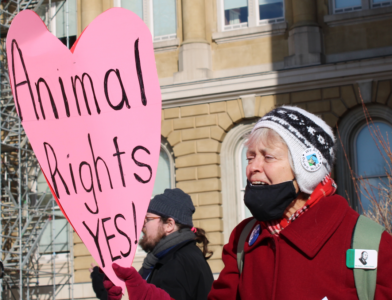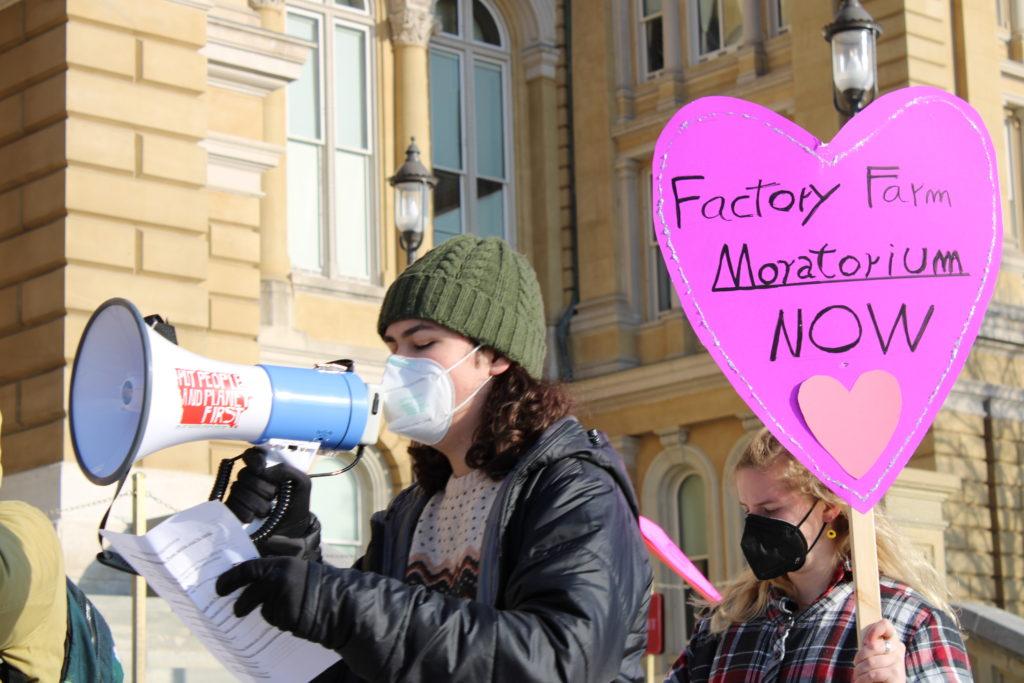On Valentine’s Day, 11 Grinnell College students and Tommy Hexter `21, Poweshiek County soil and water commissioner, demonstrated in favor of a statewide moratorium on Concentrated Animal Feeding Operations (CAFOs) on the steps of the state capitol in Des Moines. They carried heart-shaped picket signs and chanted refrains for nearly two hours with protesters from agricultural groups across the state.
CAFOs are factory farms with the purpose of mass-producing animal products. To be considered a CAFO, a farm must have at least 1,000 animal units — this equates to 700 dairy cows, 2,500 swine (over 55 lbs.), 82,000 laying hens or 125,000 broiler chickens.
Estimates of the number of CAFOs in Poweshiek County range from 14 and 60. No exact number is available because the state of Iowa does not collect information on the number of CAFOs.
The moratorium was introduced on Feb. 9, 2022, by State Representative Art Stead. Stead’s moratorium bill is the fourth CAFO moratorium bill.
During a speech at the protest, Stead said, “I’m calling on Agricultural Committee Chair Foss and the Republican leadership to give the bill a fair hearing. And if they won’t provide a committee hearing, I’m calling for an independent hearing this April.”
Tommy Alger `21, who grew up in Grinnell, said he supports the moratorium because of he experienced the effects of CAFOs which he views as damaging. “I’ve kind of been witness to seeing what industrial agriculture does to not only the environment, but also the local farming communities,” he said.

According to the CDC, the large volume of animals held in CAFOs leads to a large number of environmental hazards and risks to human health.
CAFOs release ammonia, hydrogen sulfide, methane and other molecules in the air, which creates a pungent smell akin to chicken manure. The McNulty CAFO, located eight miles southeast of the College, releases these same chemicals; when winds blow north, these molecules permeate the campus. These chemicals also may lead to asthma and decreased lung function.
Additionally, animal manure from CAFOs is used as fertilizer. When the ground is overexposed to manure, the nitrates contaminate the groundwater. This can lead to deadly health consequences.
When asked if they would have a different view on CAFOs if they were environmentally safe, Grinnell protestors Oscar Angell `25 and Tanner Alger `25 said they would still support the moratorium because they are concerned about the treatment of animals inside CAFOs.
Hexter also said he would still support the moratorium on CAFOs even if they were environmentally safe.
“I understand that some farmers rely on [CAFOs] They’ve gotten locked into the factory farm system as part of the income every year. And so I don’t think we want to punish those farmer, you know, they kind of gotten trapped by corporate agriculture,” said Hexter.
The protest was partially organized by Deborah Bunka, a member of the Iowa Alliance for Responsible Agriculture. She agreed with Hexter’s comments and said: “It’s the drying away the resources from rural communities, which is hollowing them out. You are taking all the money that is earned by factory farms, not by the person contracted to raise the animals but by the integrators.”
Studies conducted from the 1970s to early 2000s found that economic concentration of agricultural operations removes a higher percentage of money from rural communities like Grinnell than when the industry is dominated by smaller farm operations, which tend to circulate money within the community.” These studies also found that “decreased tax receipts and declining local purchases with larger operations.
“It’s not a good system for farmers,” said Bunka. “It’s not a good system for consumers, and it’s not a good system for anybody.”




























































